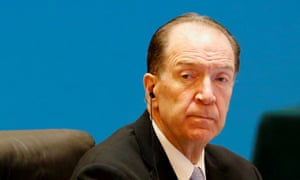
11.21am EDT11:21
The Covid-19 pandemic has led to a “tragic reversal” in development and pushed debt in poor countries to record levels, the head of the World Bank has said.
David Malpass, the bank’s president warned the virus had widened the gap between rich and poor nations, setting back progress by years and, in the case of some countries, by a decade.
Announcing new World Bank figures showing the debt burden of more than 70 low-income nations had increased by a record 12% to $860bn (£630bn) in 2020, Malpass called for a comprehensive plan to ease the debt pressures and for rich countries to make vaccines available to the less well-off.
He said one particular problem was the lack of a bankruptcy process to help in cases where debts had become unsustainable. Under the current system, companies can declare themselves bankrupt but countries cannot.
With income per head expected to rise by an average of 5% in developed countries this year compared with 0.5% in developing countries, Malpass said the problem of inequality was getting worse. The bank fears the problems of poor countries could deteriorate further as global interest rates rise from the emergency levels seen during the crisis. Malpass said:
We need a comprehensive approach to the debt problem, including debt reduction, swifter restructuring and improved transparency. Sustainable debt levels are vital for economic recovery and poverty reduction.

Updated
at 11.22am EDT
10.58am EDT10:58
In case you missed it earlier, a study of 22 million people over the age of 50 in France has found that vaccination reduces the risk of dying or being hospitalised with Covid-19 by 90%.
The research published on Monday also found that vaccines appear to protect against the worst effects of the most prevalent virus strain, the Delta variant.
“This means that those who are vaccinated are nine times less at risk of being hospitalised or dying from Covid-19 than those who have not been vaccinated,” the epidemiologist Mahmud Zureik, who oversaw the research, told AFP.
The study – the largest of its kind so far – was carried out by Epi-Phare a scientific group set up by France’s health system, its national health insurance fund, l’Assurance Maladie (CNAM), and the country’s medicine’s agency (ANSM).
9.36am EDT09:36
Calls are growing to abolish Italian neofascist movements after violent protests against Covid-19 vaccine passes in Rome, during which demonstrators tried to force their way into the official residence of the Italian prime minister.
Twelve people, including Roberto Fiore, the founder of the far-right Forza Nuova party, were arrested in connection to Saturday’s unrest, in which a group of about 30 raided a hospital accident and emergency unit – injuring four medical workers – and the offices of a trade union were stormed.
Protesters also tried to force their way past riot police and into the Chigi palace, the official residence of Italy’s prime minister, Mario Draghi, in scenes reminiscent of supporters of the former US president Donald Trump storming the Capitol in January.
Neofascists had infiltrated a crowd of an estimated 10,000 people who had gathered in central Rome to protest against a government rule that obliges public and private workers to have a “green pass” before entering their workplaces.
The measure comes into force on 15 October and will require workers to have been double vaccinated, to show proof of a negative test taken within the previous 48 hours, or of having recovered from Covid-19.
Giuliano Castellino, the leader of Forza Nuova who has been banned from protests in the capital after previous violence, allegedly incited the crowd to ransack the offices of CGIL, Italy’s oldest trade union. A gang used metal bars and sticks to smash their way into the building.
The scenes were widely condemned on Monday, with politicians from the centre-left Democratic party presenting a motion in parliament calling for Forza Nuova and other neofascist movements to be dissolved. A similar motion was presented by the centrist Italia Viva party and the Italian Socialist party.

Updated
at 9.44am EDT
9.09am EDT09:09
NHS test-and-trace units in the UK run by G4S have cut the pay of some workers by up to 5% after a new contract from the government that specifies they should receive the real living wage.
The affected workers are part of a group of 1,000 who work at mobile Covid-19 testing units at about 100 sites around the country, and are employed by G4S via the HR Go recruitment agency.
Some were told their hourly pay rate would drop from £10 an hour to a maximum of £9.50 an hour outside London, a cut of 5%. Those in London will drop from a maximum £11 an hour to £10.85, a 1.4% cut.
In a note sent to staff, G4S said the pay change was the result of a new 12-month contract with the government, under which it was required to pay all staff the real living wage, an independently verified minimum of £10.85 in London and £9.50 elsewhere.
While this will result in a pay rise for some workers, who earned as little as £9.30 an hour, others contacted the Guardian to say their pay had been cut from £10 an hour.

The letter to workers said that the previously higher rates of pay reflected “uncertainty around how long [the government] would require sites to operate”.
It said: “The longer-term nature of the [new one-year contract] provides more certainty and therefore the real living wage is more appropriate for the longer-term role.”
Sara Gorton, the head of health at the Unison union, said: “Living wage clauses are designed as a minimum – not an excuse for some greedy contractors to reduce pay.”
Updated
at 9.20am EDT











